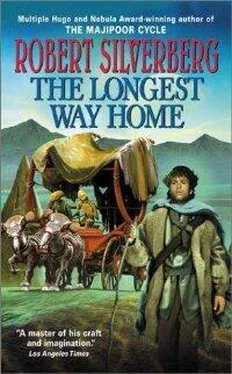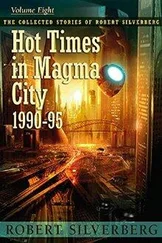He thought it would be obvious to these Indigenes that he was a Master, but he made a point of telling them anyway. It produced no discernible reaction. He explained that he was the eldest son of Martin Master Keilloran of House Keilloran, who was one of the great men of the southern continent. That too seemed to leave them unmoved. “I was sent north to spend the summer with my kinsmen at House Getfen,” he said. “It is our custom for the eldest son of every Great House to visit some distant House for a time just before he comes of age.”
“There has been trouble at Getfen House,” one of the Indigenes said gravely.
“Great trouble, yes. It was only by luck that I escaped.” Joseph could not bring himself to ask for details of the events at Getfen House. “I need to return to my home now. I ask your assistance in conveying me to the nearest Great House. The people there will be able to help me get home.” He was careful to use the supplicatory tense: he was not really asking, he was simply suggesting. Indigenes did not make direct requests of each other except under the most unusual of circumstances, let alone give each other orders: they merely indicated the existence of a need and awaited a confirmation that the need would be met. Whenever a human, even a Master, had reason to make a request of an Indigene, the same grammatical nicety was observed, not just because it was simple politeness to do so but because the Indigene ordinarily would not respond to, and perhaps would not even comprehend, anything that was couched in the mode reserved for a direct order. “Will you do that?” he asked. “I understand the closest Great House is House Ludbrek.”
“That is correct, Master Joseph.”
“Then that is where I must go.”
“We will take you there,” said another of the Indigenes. “But first you must rest and heal.”
“Yes. Yes. I understand that.”
They brought him food, a thick dark porridge and some stewed shredded meat that tasted like illimani and a cluster of small, juicy red berries: simple country stuff but a great improvement over raw mud-crawlers and half-cooked roots. Joseph’s father had a serious interest in fine food and wine, but Joseph himself, who had been growing swiftly over the past year and a half, had up until now generally been more concerned with the quantity of the food he ate than with its quality.
So he fell with great avidity upon the tray of Indigene food, but was surprised to find he could not eat very much of it despite the intensity of his appetite. The fever was returning, he realized. His head had begun to ache, his skin felt hot and dry to his own touch, his throat was constricted. He asked for and received a few more of the green succulent stems, which provided the same short-term relief as before, and then the Indigenes left him and he settled back on his bed of furs to get some sleep. The furs had a sour, tangy, insistent odor that he did not like, nor did he care for the unpleasant milky sweetness of the air itself in here, but despite those distractions he fell quickly into a deep, welcome sleep.
When he opened his eyes again daylight was coming through the slits in the walls. It had been late at night when he arrived here, practically morning; he wondered whether he had slept through an entire day and a night, and this was the second morning. Probably so. And just as well, he thought, considering the fragmentary nature of the sleep he had had in the forest.
For the first time since his arrival he thought of the noctambulo who had been his guide in the wilderness. He asked the Indigenes about it, but the only answer he got was a gesture of crossed arms, the Indigene equivalent of a shrug. The Indigenes knew nothing of the noctambulo. Perhaps they had not even noticed its presence, and it had simply wandered off after delivering him. Joseph realized that from first to last he had understood nothing of the noctambulo’s purposes and motives, if it had any. It had tracked him, it had fed him, it had brought him here, and now it was gone, and he never would know anything more.
The fever did not seem to be much of a problem this morning. It was easier for him to eat than before. Afterward he asked one of the Indigenes to help him rise. The Indigene extended one loose-jointed ropy arm and drew him to his feet, raising him in one smooth motion as though Joseph had no weight at all.
He leaned on his walking-stick and inspected himself. His left leg was purple and black with bruises and terribly swollen from mid-thigh to ankle. Even his toes seemed puffy. The leg looked grotesque, ghastly, a limb that belonged to a creature of another species entirely. Little arrows of pain traversed its length. Simply looking at the leg made it hurt.
Cautiously Joseph tried putting some weight on his foot, the merest bit of experimental pressure. That was a mistake. He touched just the tips of his toes to the floor and winced as an immediate stern warning came rocketing up toward his brain: Stop! Don’t! All right, he told himself. A bad idea. He would have to wait a little longer. How long would healing take, though? Three days? A week? A month? He had to get on his way. They would be worried sick about him at home. Surely word had reached Helikis by now of the uprising in the north. The interruption in combinant communication alone would be indication enough that something was wrong.
He was confident that once he reached Ludbrek House he would be able to send some sort of message to his family, even if the Ludbreks could not arrange transportation to Helikis for him right away, because of the present troubles. But first he had to get to Ludbrek House. Joseph could not guess how far from here that might be. The Great Houses of Helikis were set at considerable distances from one another, and probably that was true up here, too. Still, it should be no more than three days’ journey, or four by wagon. Unless these Indigenes had more interest in the machines of the Masters than those of the Southland did, they would not have cars or trucks of any sort, but they should, at least, have wagons, drawn by teams of bandars or more likely, he supposed, yaramirs, that could get them there. He would inquire about that later in the day. But also he had to recover to a point where he would be able to withstand the rigors of the journey.
Joseph hunted through the utility case to see if it contained medicines of any sort, something to control fever, or to reduce inflammation. There did not seem to be. An odd omission, he thought. He did find a couple of small devices that perhaps were medical instruments: one that looked as if it could be used for stitching up minor wounds, and another that apparently provided a way of testing water for bacterial contamination. Neither of those, though, would do him any good at present.
He asked for and got more of the succulent herb. That eased things a little. Then, when it occurred to him that bandaging his leg might speed the process of healing, he suggested to one of the Indigenes who seemed to be in virtually constant attendance on him that it would be helpful if the Indigene were to bring him a bolt or two of the light cottony fabric out of which they fashioned their own clothing.
“I will do that,” the Indigene replied.
But there was a problem. The leg was so stiff and swollen that he could not flex it. There was no way Joseph could reach down as far as his ankle to do the wrapping himself.
“What is your name?” he said to the Indigene who had brought the cloth. It was time to start making an attempt to look upon these people as individuals.
“I am Ulvas.”
“Ulvas, I need your help in this,” Joseph said. As always, he employed the supplicatory tense. It was becoming quite natural for him to frame his sentences that way, which Joseph took as a sign that he was not just translating his thoughts from the Master tongue to Indigene, but actually thinking in the language of the Indigenes.
Читать дальше












